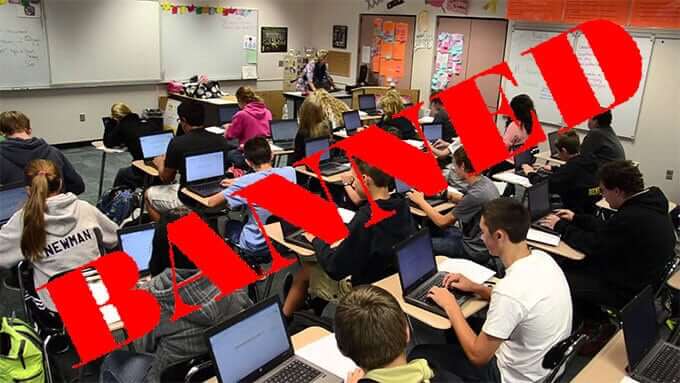With everyone back in school, I thought it might be a good time to revisit a topic that pops up in university classrooms every year: the banning of laptops.
The Globe and Mail reported in August that it’s becoming standard practice in Canadian universities to prohibit laptops from lecture halls. American universities are also getting on board with no-laptop policies, as the campus newspaper of the University of North Carolina explained earlier this year. In the UK and Europe, while banning laptops seems to be less widespread, it isn’t entirely uncommon.

Typically, it’s not the universities, but specific professors who tell students at the beginning of the year that laptops are verboten and that classrooms are pens-only. Some even include it in the syllabi.
Why?
The two most commonly given reasons:
- Students inevitably will be distracted by social media, games, videos, etc. Studies have shown that even advanced students who use laptops for non-academic purposes in class score worse on exams.
- Additionally, there’s been quite a bit of research in recent years that indicates students absorb information and ideas more effectively with handwritten notes than typed.

A third reason, not as commonly cited, is that laptops can distract other students, whether it’s the tapping of the keys or what appears on the screen and is visible to those seated nearby.
Interestingly, take a look at what some UK uni students had to say about laptops in lecture at the The Student Room forum:
*Not many people use laptops in my lectures. Some of them use it to play games during the lecture. Some follow along with the powerpoint. Others write notes but I find it can get annoying if their laptop keyboard makes a lot of noise, because then you can just hear tap tap tap tap.
*I do it, mainly because I’m ridiculously slow at writing but fairly fast at typing so it’s just more practical for me. A fair few people in my lectures do it and it’s never seemed to cause bother before.
*For me, I think if the lecture started to get boring I would go on the internet, at least with pen and paper I’m kind of forced to listen/concentrate.
*Depends on the lecturer, some wont let us because we are games students. For some reason they think we’d be playing a massive online game together in the lecture instead of paying attention… they’re probably right.
*Quite a few people take laptops into lectures and I’ll probably start doing so next term as I usually just print and annotate lecture slides and then type them up at home so it would probably be easier to type them up during the lecture. Also, I hate when the lecture goes through the slides too quickly for me to jot things down so being able to have the slides open will be useful, too.
( At some universities, lecturers can load presentations into a system students can access online.)
As you can see, there are many different takes on the pens-only issue, even among students. Here’s another UK student who argues against laptops in lectures. Meanwhile, University of Virginia student Bobby Doyle opines that laptops are better for taking notes.

He makes some excellent points here:
Despite what some professors say, computers can be a great resource in class. Typed notes are more flexible, letting students organize them in a sensible way. The ability to look up unfamiliar words and concepts on the fly is also a nice advantage. Computers also provide the ability to write notes faster, providing more detail. There are some math and science diagrams that are hard to convey on a computer, but for almost every other subject computers are a great resource for taking notes.
And as much as I consider myself a pen-and-paper guy, I also find myself agreeing with him.
One of the arguments for taking handwritten notes in class is that students aren’t fast enough to just write down every word out of the professor’s mouth. They are forced to think about what they’re hearing, to distill it into well-defined ideas, and to mentally imprint those ideas by writing them down.
This is something I had to do all the time as a newspaper reporter. When you’re interviewing someone at a news scene, you can’t write down every single word. You have to write down ideas and facts and the occasional verbatim quote.
But some people talk so fast, putting out such a flood of information, that it’s extremely difficult to distill all of it on the fly. Especially when you want to get it right.
There’s not much you can do about that when conducting interviews in the field. However, that experience taught me to start typing notes on my computer whenever I was interviewing someone on the phone.
It was much faster and allowed me to take down almost everything a person said. Having that record allowed me to take my time with the information later. Then, I could review it, distill it, and pick out the main thoughts without simultaneously having to write and listen.
And I can remember some lecturers from college who who were the same way. They spit out information like a machine gun spits out bullets: way too fast. That made it incredibly difficult to keep up when taking handwritten notes.

You’d see students after class asking the professor to repeat some part of the lecture they missed. Not all university instructors are keen on that sort of thing.
The point that Doyle makes about organization also is very valid.
I swear by Evernote and OneNote. Everything I write down eventually makes it into one of those applications. They’re incredibly useful for organizing notes into searchable files that put all of your information at your fingertips. Unfortunately, there isn’t really a good, easy way of converting handwritten notes into searchable text, so I end up typing a lot of handwritten notes into one of the apps.

If I were a student, dealing with the volume of notes they take, that just would not be an option. (It’s also one of the reasons the Art of Manliness recommends laptops in this excellent students’ guide to note-taking.)
Finally, as the students above mentioned, lecturers show a lot of slides. Having a laptop allows them to follow along at their leisure, instead of hoping to grasp everything on a slide before the instructor whisks it away.
So, I come down on the side of laptops in the classroom.
Yes, there is the risk of distraction, but let’s be honest, students who are that easily distracted probably wouldn’t pay a ton of attention to lectures anyway. And, while writing it by hand is a more effective way of learning information, that’s something that can and should be done when revising.
Laptops and handwriting doesn’t have to be an either/or proposition…it can be both.
I, too, type faster than I write. I don’t use a laptop to take notes during meetings or classes because I find that they interfere with my concentration on the speaker. I end up asking fewer questions. It seems to me a better strategy to record the lecture, then go back and rewrite or type notes later.
However, as someone who teaches face to face classes in a university setting, I can pretty much validate that most students are not taking notes on laptops. I do wish it were otherwise, but I am not seeing it. Students often think they can hide this, but it’s in the faces of the people around them when it isn’t in their own faces (the people around them can see the screen, too, if there’s no privacy filter–and more often than not, there’s not one–and when they start snickering or reading intently over the person’s shoulder, it’s not because the student’s notes are so good).
The evidence is that laptops and digital devices seem to interfere with student learning for a number of reasons. See this article from Scientific American (I rather respect Scientific American’s reporting):
https://www.scientificamerican.com/article/a-learning-secret-don-t-take-notes-with-a-laptop/
Nonetheless, I allow laptops in the classroom because I usually teach from digital texts and I refer to online sources and presentations.
I do find that students with laptops are not as engaged in the class discussion, perhaps for the same reason that I am not when I use them, and I discuss that potential problem with students, but I’m not going to police adults. I give a participation grade, and if students are participating with their friends on Facebook or wherever instead of participating in the classroom with the people who are around them, that’s their problem. It will affect their rather hefty (20%) participation grade.
What I am concerned about it that Mueller and Oppenheimer’s study showed that it wasn’t only the grades of the students using laptops that suffered in the classroom. The grades of students around them, suffered, too, because of the distractions. Perhaps that’s one of the reasons for the bans that these schools are instituting.